Starting a podcast is no walk in the park; it takes a lot of research, preparation, and setup before you ever even sit down to hit record. The most successful podcasters all share one goal: to create a unique listening experience for their audience—bonus points if you can offer value by way of education, self-improvement, or some other method. But before you can get your podcast heard, you’ll have to select the best podcast hosting platform that aligns with your needs.
To help streamline the launch of your podcast, we’ve compiled a list of the best podcast hosting platforms, each with a brief intro, highlighted key features, and pricing plans. We’ve ranked the platforms based on cost, upload and bandwidth limits, monetization tools, and more. Let’s get started!
Click the links below to skip ahead:
| Podcast Platform | Features | Monthly Pricing |
|
| |
|
| |
|
| |
|
| |
|
| |
|
| |
|
| |
|
| |
|
| |
|
| |
| Audio Podcasts
Video Podcasts
|
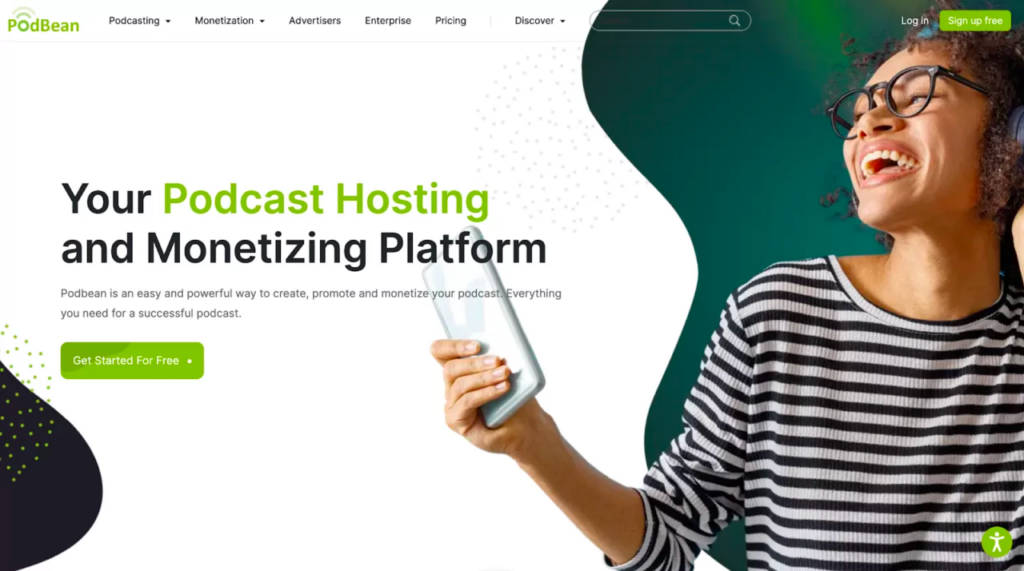
With over ten years of experience, PodBean is the best podcast platform on our list, with an impressive 600,000 podcasters. PodBean gives users access to easy-to-read analytics like downloads by time and day, trends, top 10 episodes, listener demographics, and user retention. This platform also harnesses the power of AI, allowing you to enhance audio quality and generate descriptions, chapters, and detailed transcripts.
Once your podcast is published, PodBean can automatically share your episodes on connected social media accounts, helping you to promote your show. As for other forms of marketing, PodBean features native advertising, premium podcasts, and patron features, helping you to monetize your content without having to leave the platform. Podbean is an excellent choice for new and experienced podcasters needing a wide range of tools.
Key features
- Available free plan
- Customizable podcast website on all plans
- Embeddable and customizable podcast player for your website
- Native tools for easy podcast monetization
- Auto-sharing on connected social media accounts
Price range:
PodBean is one of the few platforms that offers a free plan. Their free plan supports mp3 file formats and includes 5 hours of storage (500MB) and 100GB of monthly bandwidth.
In addition to the free plan, PodBean offers 3 paid plans: Unlimited Audio ($14), Unlimited Plus ($39), and Network ($99). The Unlimited Audio and Unlimited Plus plans feature unlimited storage space and bandwidth, while the Network plan limits bandwidth to 3TB with the option to pay for more.
If you want to add multiple administrators, upload video podcasts, or use any of PodBean’s monetization tools to make money from your podcast, you’ll have to opt for one of the paid plans, as each one offers a different combination of features.
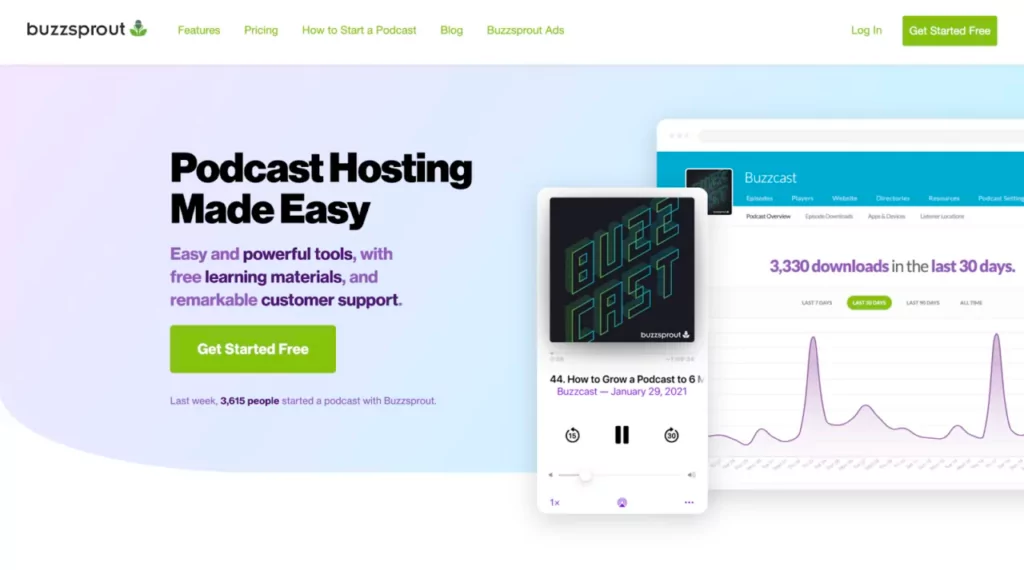
Earning the second spot in this list of the best podcast hosting platforms is Buzzsprout, which is home to over 120,000 podcasters. This platform offers advanced analytics that let you track how many people download your episodes, where they’re from, and how people access your show. They also give you access to a range of tools like an embeddable episode player for websites, optional episode transcription, and “Dynamic Content,” which lets you change pre and post-roll segments, even after publishing.
By uploading to Buzzsprout, you’ll be able to list your podcast on all of the top directories, including Apple Podcasts, Spotify, Google Podcasts, iHeartRadio, Alexa, Castro, Podchaser, and more. The platform will also automatically optimize uploaded files, making your audio the best it can be. And with native payment and premium content features, monetizing your podcast is a breeze.
Key features
- Customizable podcast website on all plans
- Ability to create chapter markers for episodes
- Advanced statistics for tracking your progress
- Dynamic content lets you change pre and post-roll segments after publishing
- Monetize your content with payments and subscriptions
Price range:
While limited, Buzzsprout offers a free plan that allows for up to 2 hours of uploads. For paid options, they offer 3 plans: $12, $18, and $24 per month. The only difference between their paid plans is the available upload hours each plan includes. Unfortunately, you won’t find annual pricing at this time, so you’ll have to stick with the monthly pricing.
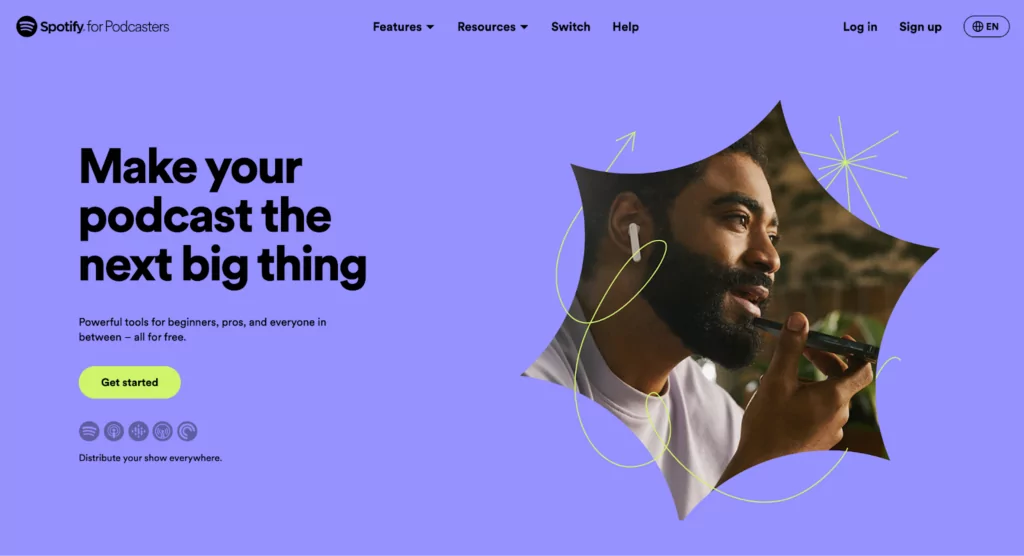
Already home to some of the world’s largest podcasts, Spotify is leaning into podcasts with its all-in-one podcasting platform. Spotify for Podcasters boasts hosting, recording, editing, analytics, engagement, and monetization tools as part of the free all-inclusive platform.
Committed to another host? You can still utilize Spotify’s free growth tools, which will help you get a pulse on your audience and what they enjoy. Because Spotify is one of the most important publishing destinations for podcasters around the world, this platform will appeal to many new and established podcasters alike. And despite creating and hosting a podcast on Spotify, creators will still be able to distribute to other platforms like Apple podcasts.
Key features:
- Comprehensive audience analytics
- Create and upload video podcasts natively
- Monetize directly on the Spotify for Podcasters platform
Price range:
Spotify for Podcasters is a free, all inclusive platform.
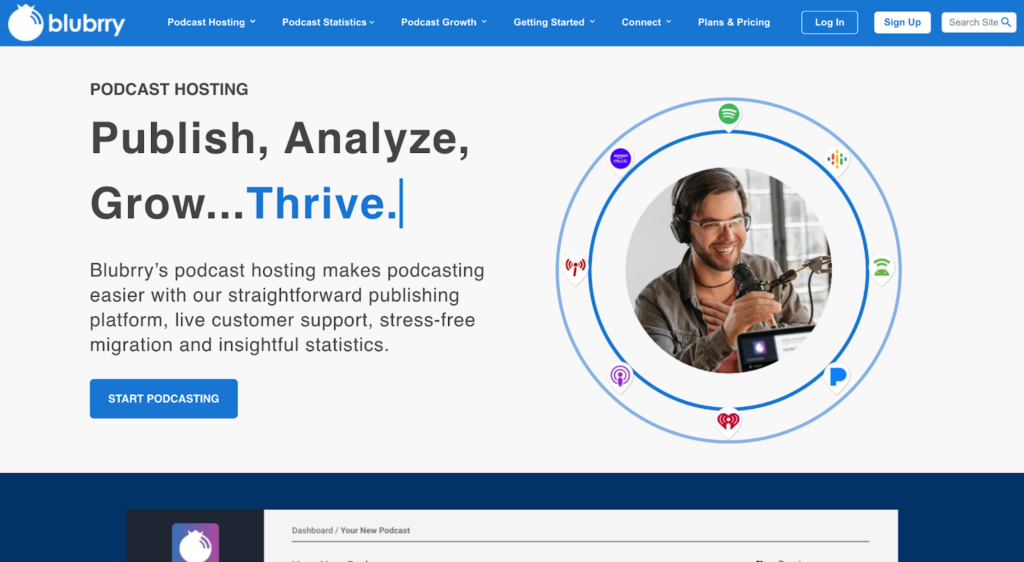
Blubrry podcast hosting is well known for its advanced statistics and industry-leading IAB Certified Compliant Statistics. This platform is ideal for experienced podcasters in need of a host that can measure and report key data about their show.
Additionally, this platform is an excellent choice for podcasters looking to create or integrate with an existing WordPress website. Creators can easily monetize their podcasts and generate transcriptions all on Blubrry.
Key features:
- Included WordPress website
- PowerPress WordPress plugin for seamless website integration
- Native transcription and closed captioning services
Price range:
Blubrry offers some affordable podcast hosting plans: Standard Hosting ($12), Advanced Hosting ($20), and Professional Hosting ($100) per month. Notably, all plans include a WordPress site, transcription services, and unlimited plays and listens. However, total storage is restricted to 125 MB with the Standard plan, 400MB with the Advanced plan, and unlimited with the Pro plan.
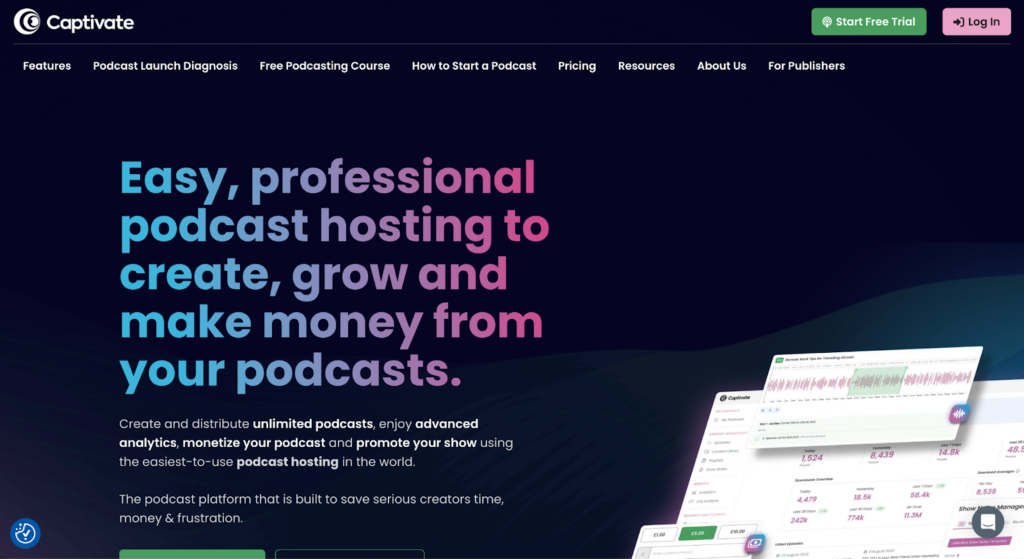
Of the best podcast platforms in this list, Captivate offers highly competitive features. If you’re starting a podcast without an audience or any podcasting knowledge, Captivate Growth Labs is included in all plans. This is both a full video library and a community for podcasters to learn everything they need to know about podcasting.
Captivate’s hosting dashboard is also well-known in the industry for its straightforward interface. Podcasters can easily monetize with merchandise, ads, live events, services, subscriptions, and tips. When you’re ready to publish, this platform will help you to easily distribute your episodes on all major podcast directories and markets with built-in marketing tools.
Key features
- Customizable podcast website on all plans
- Unlimited podcasts, uploads, and storage on all plans
- Optional Captivate Sync™ WordPress Plugin for flexible hosting control
- Premium/private podcasting on all plans
- Unlimited team members with customizable roles
Price range:
Captivate offers 3 plans: Personal ($19), Professional ($49), and Business ($99). While there is no free plan available, you can enjoy a free 7-day trial for any plan. All plans offer unlimited podcasts, uploads, and storage. The main differences between paid plans is in the number of downloads permitted: Personal (30,000), Professional (150,000), and Business (300,000).
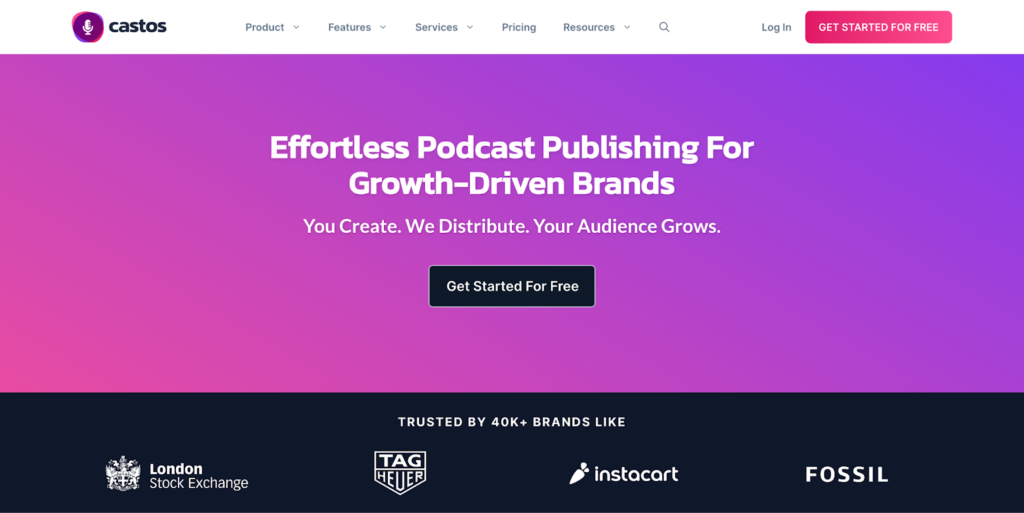
Trusted by more than 40,000 brands, Castos is a robust podcast hosting platform. Where this platform shines is in its online capabilities. Castos offers free custom websites designed to showcase your podcast. The platform also offers automatic podcast transcriptions, YouTube republishing, and comprehensive podcast analytics.
In the event that you already have a website, integrate it with your existing site using the Seriously Simple Podcasting tool. This allows podcasters to manage their podcast hosting directly from a WordPress site. As for monetization, Castos makes it easy to drive revenue from your podcast with dynamic ads and direct payments.
Key features
- Customizable podcast website on all plans
- Unlimited podcast episode uploads
- Private podcasting feature for premium content
- Pre-built web page templates
- Automatic podcast transcriptions (optional)
- YouTube republishing
Price range:
Castos offers 4 pricing plans: Essentials ($19), Growth ($49), Pro ($99), and Premium ($499) per month. Opting for annual payments will save you around 17% in total. And while the starter plan includes your general features, only the Growth plan and above include YouTube republishing.
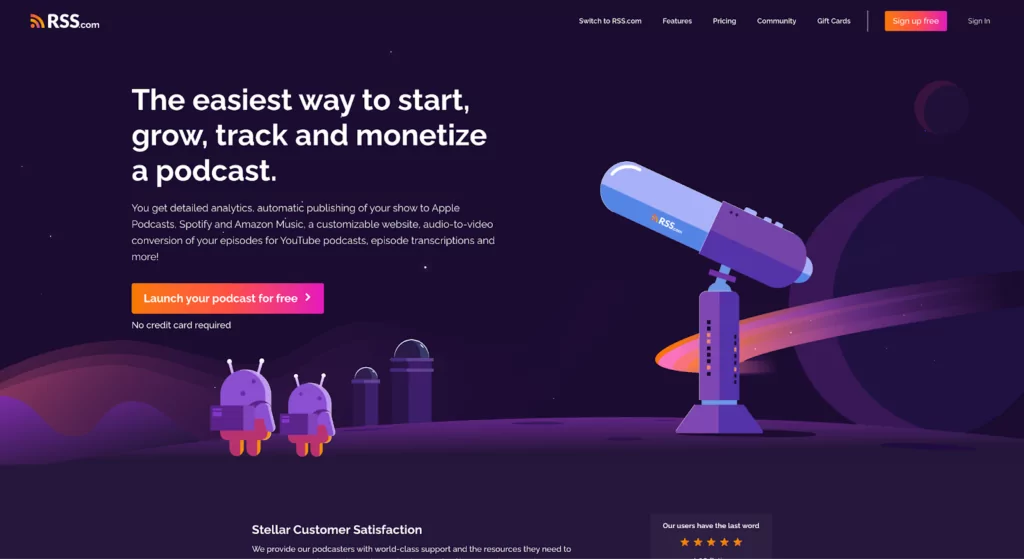
RSS.com features a user interface that’s known for its ease of use. This platform gives users access to features like comprehensive analytics, episode scheduling, an embeddable episode player, social media sharing, and an included podcasting website.
Setting itself apart from other podcast hosting platforms, RSS.com offers a donation button you can enable. This lets you access funding outside of the typical sponsorship and ad methods. But, if sponsors and ads are more your style, they have that too. Podcasters can find sponsors with RSS.com’s Podcorn marketplace.
Key features
- Unlimited episodes and audio on all plans
- Customizable podcast website on all plans
- Native episode scheduler
- Optional donation button
- Ability to create episode chapters, soundbites, and transcripts within the platform
Price range:
While it looks like RSS.com officially offers 3 plans, most users will only be eligible for the All in One Podcasting plan at $14.99 per month. Students and Non-government Organizations can use a plan just for them at $4.99 a month. The Student plan includes the same features as the All in One plan, but you’ll have to be approved. And, anyone with over 10,000 daily downloads will be eligible for the Podcast Networks plan, but you’ll have to contact the platform to get started.
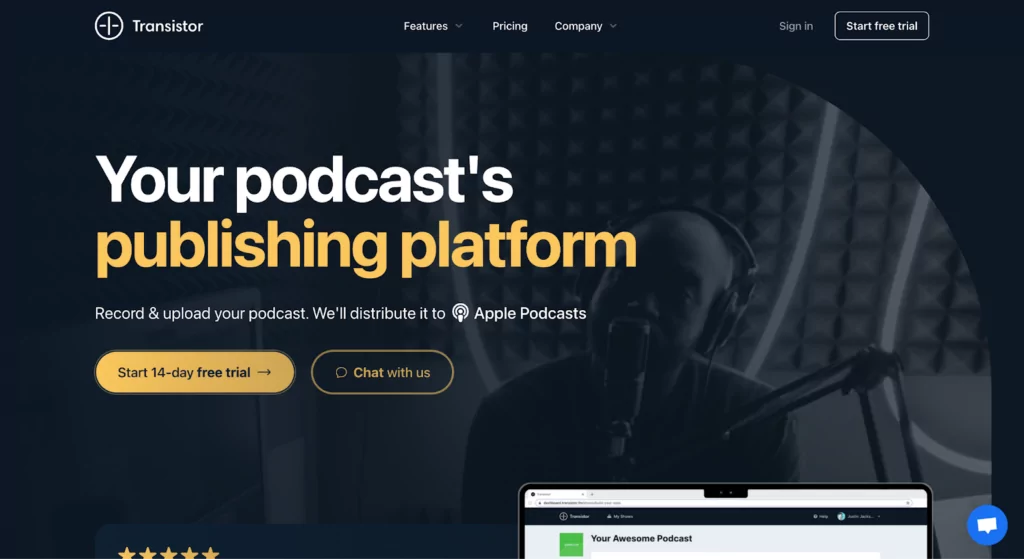
Transistor is a high-quality podcast hosting platform that includes big-name podcasts like Cards Against Humanity. They offer comprehensive analytics, private podcasts, and 1-click distribution to all of the most popular directories. They also provide 1-click distribution to Listen Notes and The Podcast Index, 2 popular search engines dedicated just to podcasts.
Transistor is an excellent choice if you have multiple podcasts. The platform offers unlimited shows on all plans. And they don’t limit podcasters by storage or bandwidth, only by monthly downloads, which makes understanding limits much easier.
Key features
- Customizable podcast website on all plans
- Unlimited podcasts in all hosting plans
- Dynamic Ad tool for intuitive and automatic ad insertion
- Automatically upload each episode to YouTube
- Unique RSS feeds for every show you have
Price range:
Transistor offers 3 pricing plans: Starter ($19), Professional $49), and Business ($99). All three plans offer unlimited podcasts and team members. However, the amount of private subscribers and monthly downloads allowed under each plan increases as you move up in cost. Thankfully, the Start plan offers more than enough for the average podcaster, with up to 50 subscribers and 20,000 monthly downloads.

Audioboom is a reasonably standard platform for most users, offering distribution to popular directories, unlimited episodes, and a high 15,000 download limit per month on their entry-level plan. The platform’s approach to podcast monetization is what sets this platform apart from the others. Podcasters can access the monetization marketplace once they reach 10,000 monthly downloads. For users with a large following, this won’t affect your podcast much. But if you’re a smaller show, it could mean missing out on the potential to monetize until you reach that pivotal milestone.
Key features
- Unlimited episodes per month
- 15,000 downloads per month on entry-level plan
- IAB compliant analytics dashboard
- Access to global advertising marketplace once you reach 10,000 monthly downloads
Price range:
Audioboom effectively offers three pricing plans. However, their highest tier, the Podcast Pros Account, is only accessible to those with 50,000 or more downloads per month. Podcasters who haven’t reached that milestone yet can sign up for their Standard or Plus Plan, at $9.99 and $19.99 per month, respectively. These plans offer unlimited episodes, between 15,000 and 50,000 downloads per month, audience insights, and access to the platform’s global advertising marketplace.
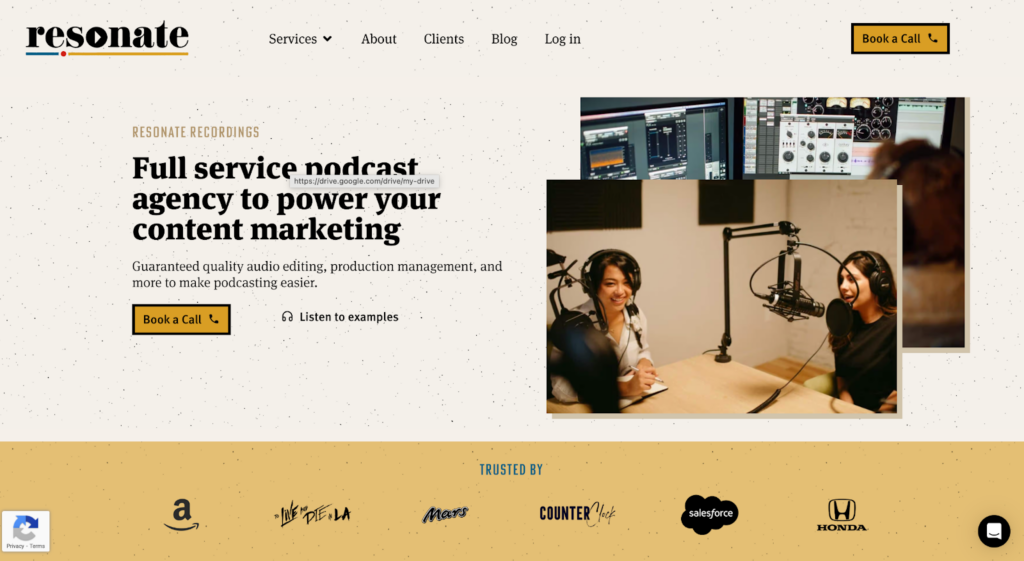
Resonate is an excellent podcast hosting platform for those needing a one-stop shop. While their hosting plans offer a few of the standard features, they’re noticeably missing a customizable website, private/premium podcasting, and customer support on their lower-priced plans. But where Resonate lacks in common features, it may make up for with add-on services.
Resonate offers a wide range of supplemental podcast services, including producer, launch, production, video production, podcast marketing, and enterprise services. These additional services allow podcasters to create a high-quality, heavily produced show all without leaving the platform.
Key features
- Automatically generated podcast microsite
- Detailed analytics from embedded player
- Built-in Dynamic Ad insertion with time-sensitive announcements and timed campaigns
Price range:
Resonate offers 2 ready-to-go monthly plans: Basic ($25) and Premium ($49). Both of these include unlimited episodes, downloads, and show users. Unfortunately, the microsite is only available on the Premium plan, separating Resonate from platforms that include websites in their most basic plans. If neither the Basic nor the Premium plan fits your needs, consider the Professional plan, which grants you even more microsite and support features.
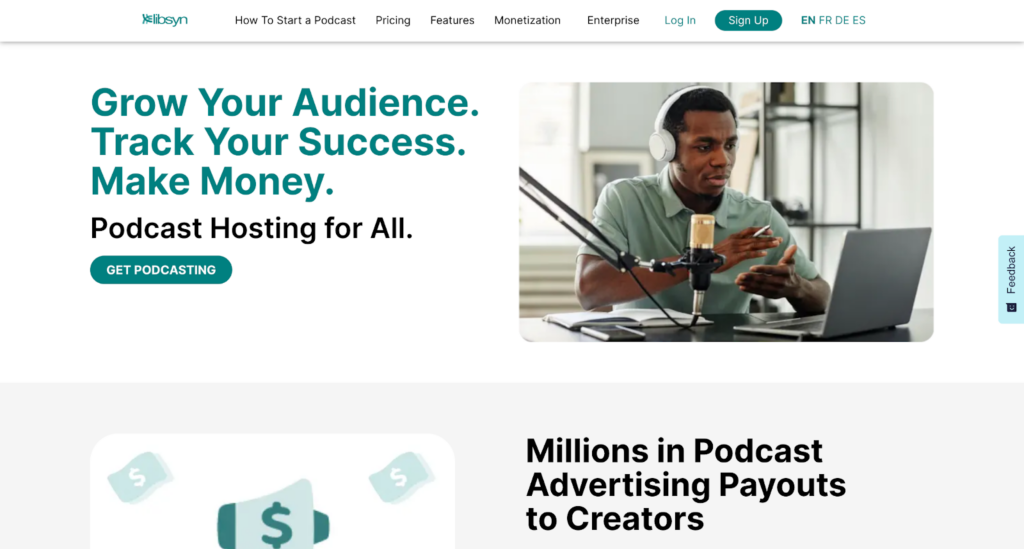
Going all the way back to 2004, Libsyn is a long-time player in the podcast industry. It’s a great platform for new creators, hosts with short episodes and a low episode count, or monetized podcasts. It’s important to note that this platform limits uploads and bandwidth, which may lead to issues for podcasts with a large library of content or a lot of listeners. To increase storage and bandwidth, you’ll have to opt for larger plans, which is why this platform is best suited for small audiences or shows generating profit.
Key features
- Customizable podcast website on all plans
- Built-in monetization with ads and private podcasting
- Integrated visual-builder with Canva
- Custom iOS and Android app for your show
- Distribution to all popular podcast directories
Price range:
Libsyn offers a grand total of 6 plans: 3 for audio-only podcasts and 3 for video podcasts. This plan structure distinguishes them from other platforms, positioning them (and you) well for a video-forward podcast movement.
Audio Podcasts
The audio-only pricing plans start at $7 and go up to $15 and $20 per month. Unfortunately, unlike other platforms on this list, Libsyn limits the number of audio hours you can upload along with total storage. Opting for a more expensive plan will get you more of both.
Video Podcasts
Video podcast plans start at $40 and then increase to $75 and $150 per month. At this level, the analytics remain the same, and only the upload and bandwidth limits change, again increasing as you pay more.
Final thoughts
There you have it! Eleven of the best podcasting platforms. Picking a platform is the first of many decisions you’ll have to make as a podcaster. As you continue to research the best platform, make sure to consider your own unique podcasting needs. Look first at your basic needs like uploading, bandwidth, downloads, and budget. Then, consider your monetization strategy and social media connectivity once you’ve narrowed the list down to your top choices.
Want more resources on starting a podcast? Check out our other podcasting posts:
- How To Promote Your Podcast
- How To Start A Podcast with No Audience (Steps & Examples)
- How To Start A Successful Podcast (Step By Step Guide)
- How To Make Money Podcasting
- How To Write a Podcast Script
This blog was originally published in December 2022, it has been updated in January 2024.






